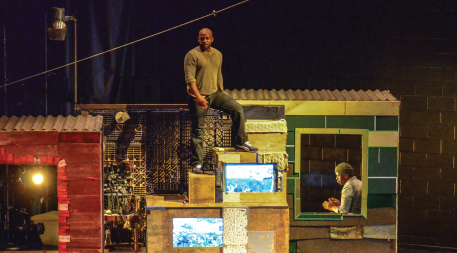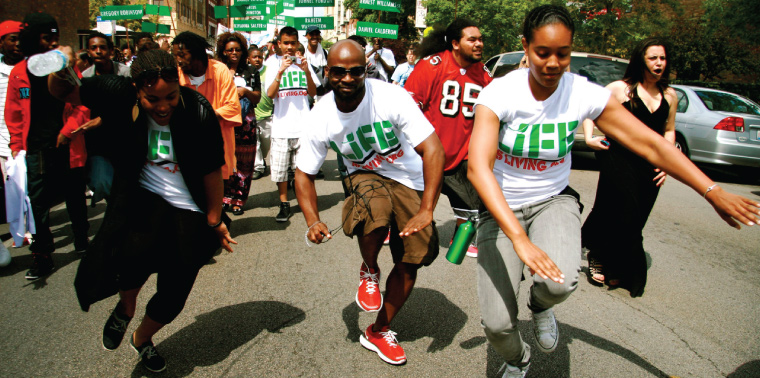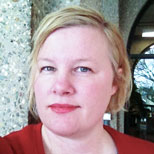December 30, 2013 — National Poetry Slam champion. Rockefeller fellow in the performing arts. One of Smithsonian magazine’s Top Young Innovators in the Arts and Sciences. Director of performing arts for the Yerba Buena Arts Center in San Francisco. Marc Bamuthi Joseph has serious artistic credentials. He also is a powerful voice for an urban green movement that pushes conversations about sustainability to include activities that support healthy living, particularly in communities plagued with urban crises such as gang violence and high dropout rates.
“I grew up in New York. I knew buildings, urban sprawl, trains and grids,” says Joseph, who now lives in the Bay Area. “I didn’t really get the preciousness of the planet until I was able to see it.”
When he made the move to the West Coast, Joseph moved into Bayview Hunters Point, a predominantly poor African-American neighborhood. The area is dotted with rundown housing projects and grapples with the legacy of pollutants from an old naval shipyard. Crossing the Golden Gate Bridge on his way to work, Joseph was struck by the juxtaposition of the natural beauty of the region and the pervasive toxicity in his own neighborhood; the disconnect between marginalized, under-resourced communities where life itself isn’t even always a shared value and the environmental movement at large.
Joseph argues that both the language and the spirit of the environmental movement need to be more expansive and more accessible. He considers the work of people such as Paul Hawken and Majora Carter foundational.
“I think [Majora Carter] is probably the most visible among those of us contemplating urban environment not as an oxymoron, but actually looking at people as part of the environmental discourse,” Joseph says. He points out that you don’t need to know your carbon footprint or even what a carbon footprint is to be part of the green movement. “We need to make the discussion available to an expanded public,” says Joseph. “It’s about language and who gets to speak.”
Joseph starts that conversation with a simple question: What sustains life in your community? Answers to that inform a mix of activities that weave together hip-hop-infused performance and community engagement: Life Is Living, a series of urban eco-festivals that bring together under-resourced communities with green-action agencies to create dialogue around living healthier lives; the Living Word Project, through which Joseph develops performances that draw on the stories he collects; and Youth Speaks, a program that uses spoken word as a vehicle for expressing views on the environment.
The latter propelled Joseph from awareness to activism. Under his direction, Youth Speaks traveled around the globe giving performances in partnership with Robert Redford’s Sundance Institute. Yet, despite the warm embrace by eco movers and shakers, the experience left Joseph feeling ambivalent.

Joseph’s multimedia performance — red, black and GREEN: a blues — explores themes at the intersection of environment and social justice. Photo by Eric Allix Rogers (Flickr/Creative Commons).
“When you are dealing with people of a certain level, you are not in the transformation business but in the affirmation business,” says Joseph. The young performers were, he observed, simply providing “spoken word codas” for a largely homogeneous green movement. He realized that what he really wanted to do was engage marginalized communities, and he chose hip-hop, a culture that amplifies the experiences and concerns of the marginalized, as the foundation on which to build. “I wanted to make hip-hop a fulcrum if not a focal point of the creative process,” he says.
Joseph’s multimedia performance called red, black & GREEN: a blues, which he has staged at a number of major arts institutions, is a vivid demonstration of the skillful way the artist weaves together message and medium. He pulls stories, history and poetry together into a visceral investigation of what Yerba Buena Center for Arts, where the performance premiered, describes as “emerging definitions of environmentalism in [urban] communities.” As with everything Joseph does, the product is a by-product of the process — a process predicated on inclusion.
“Everything about our world is winner-take-all zero sum,” says Joseph. “Everything is yours or mine. It can’t be ours.” Achieving sustainability in the broadest sense will require a radical change in that equation.
“Nature tells us homogeneity is the wrong approach,” Joseph says. “Instead of siloing the conversation where it has already happened [among scientists and scholars], we need to move the discussion to places and ways available to an expanded public.” ![]()
This article originally appeared in the Fall 2012 issue of Momentum magazine, Ensia’s predecessor.
Ensia shares solutions-focused stories free of charge through our online magazine and partner media. That means audiences around the world have ready access to stories that can — and do — help them shape a better future. If you value our work, please show your support today.
Yes, I'll support Ensia!
